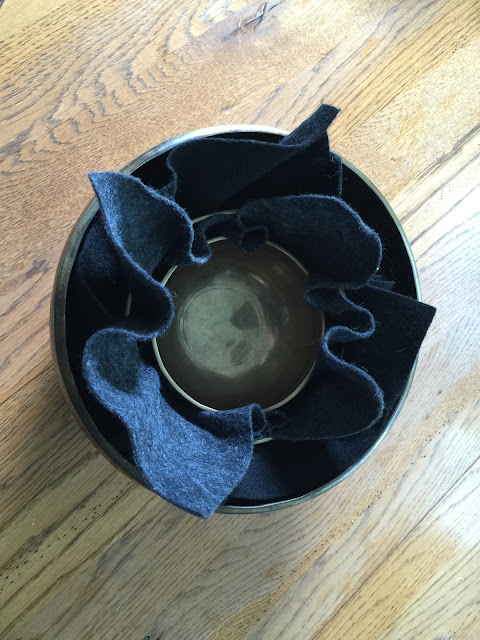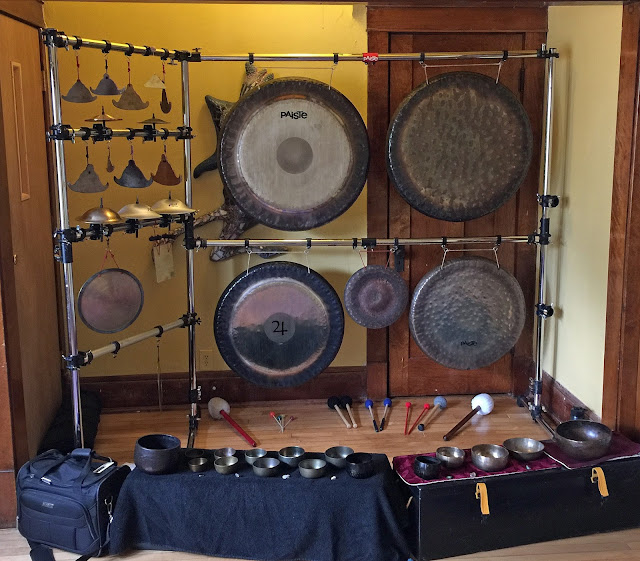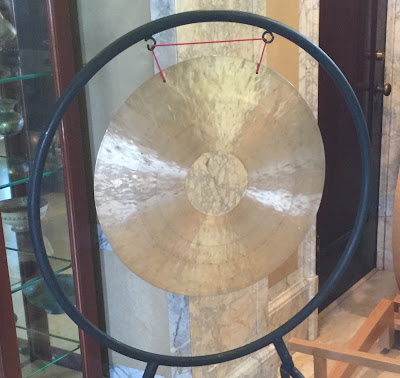Maintenance Part 2
If like me, and you travel and set up/tear down your gear often, then it's important to check it over and make sure things are fine. Last time I talked about mallets and Gong cords. This time we'll look at everything else.
Your Instruments
It's important to regularly check your instruments for damage. Gongs, bells, bowls can all be nicked or dented while traveling. Sometimes these things can lead to further problems like cracks, or they can seriously change the sound. So it's important to regularly inspect your instruments. Small nicks or burrs can often be smoothed out with a fine emery cloth or steel wool. Larger ones may need to be carefully filed. Dents, depending if they affect the sound or playability, can often be hammered out. If you find something and are not sure of fixing it yourself, seek out someone qualified to take a look at it. As I have said many times before, if you travel with your instruments, you need to have quality cases or bags to protect them. These instruments represent a large investment, so take care of them. And if you put multiple instruments in the same case/bag, make sure there is something between them (cloth, carpeting, padding) so that they don't knock or rub on each other.
Your Cases
Cases and bags are not indestructible. In fact, they are designed to take the wear and tear instead of your instruments. Regularly check them for damage. Hard cases can crack or become deformed. Bags can rip or have stitching come undone. Straps can become worn or break. Buckles can break. If your case/bag won't stay closed, your instrument/s might fall out and become damaged.
Your Stands
Stands aren't indestructible. They too can become damaged over time and travels. Fastening parts may break or become bent, making it difficult to secure your stand. Tubes can become bent, so that the stand won't fit together right. Something very important to watch for are flaking chrome, burrs, or sharp edges. No one wants to reach into their stand bag and cut their hand (I did). Your hands are your livelihood, so keep them safe!
And keep your stands in quality cases or bags. I can never emphasize enough that if you travel, even infrequently, all your gear needs to be in bags or cases. This does not mean pillow cases or wrapped up in a blanket. I'm always amazed when I see people show up with their gear in an old cardboard box or milk crates. Take care of your stuff!
And finally, people often want to help carry your gear. Make sure they know the proper way to carry things and how to put them when they set them down.
Part of this is because I want to make sure that everything I brought with me, goes back with me. It's too easy for someone else to put something in the wrong place and then it doesn't end up in your van or car. This happened to me once when I was playing 2 different events in the same city. When I got to the second event, I was missing a case. I had to drive all the way across town to retrieve the missing case and then back to the gig with barely enough time to set things up. Also, I pack my van the same way every time, so I can easily inventory all my gear and immediately know if something is not there. Depending on my set up, I carry from 7-15 bags/cases with me. That's a lot of gear to keep track of!
Take care of your gear and it will last a lifetime!
~ MB
Your Instruments
It's important to regularly check your instruments for damage. Gongs, bells, bowls can all be nicked or dented while traveling. Sometimes these things can lead to further problems like cracks, or they can seriously change the sound. So it's important to regularly inspect your instruments. Small nicks or burrs can often be smoothed out with a fine emery cloth or steel wool. Larger ones may need to be carefully filed. Dents, depending if they affect the sound or playability, can often be hammered out. If you find something and are not sure of fixing it yourself, seek out someone qualified to take a look at it. As I have said many times before, if you travel with your instruments, you need to have quality cases or bags to protect them. These instruments represent a large investment, so take care of them. And if you put multiple instruments in the same case/bag, make sure there is something between them (cloth, carpeting, padding) so that they don't knock or rub on each other.
Singing Bowls nested with felt between them
Your Cases
Cases and bags are not indestructible. In fact, they are designed to take the wear and tear instead of your instruments. Regularly check them for damage. Hard cases can crack or become deformed. Bags can rip or have stitching come undone. Straps can become worn or break. Buckles can break. If your case/bag won't stay closed, your instrument/s might fall out and become damaged.
I once had a large flight case with 3 Gongs (32/28/24") go down a full flight of concrete stairs. The case was scratched up, but the Gongs inside were fine.
A case for everything
Your Stands
Stands aren't indestructible. They too can become damaged over time and travels. Fastening parts may break or become bent, making it difficult to secure your stand. Tubes can become bent, so that the stand won't fit together right. Something very important to watch for are flaking chrome, burrs, or sharp edges. No one wants to reach into their stand bag and cut their hand (I did). Your hands are your livelihood, so keep them safe!
Chrome flaking off a rack tube
Razor sharp piece of chrome
And keep your stands in quality cases or bags. I can never emphasize enough that if you travel, even infrequently, all your gear needs to be in bags or cases. This does not mean pillow cases or wrapped up in a blanket. I'm always amazed when I see people show up with their gear in an old cardboard box or milk crates. Take care of your stuff!
And finally, people often want to help carry your gear. Make sure they know the proper way to carry things and how to put them when they set them down.
I try to have as few people as possible touch my gear.
Part of this is because I want to make sure that everything I brought with me, goes back with me. It's too easy for someone else to put something in the wrong place and then it doesn't end up in your van or car. This happened to me once when I was playing 2 different events in the same city. When I got to the second event, I was missing a case. I had to drive all the way across town to retrieve the missing case and then back to the gig with barely enough time to set things up. Also, I pack my van the same way every time, so I can easily inventory all my gear and immediately know if something is not there. Depending on my set up, I carry from 7-15 bags/cases with me. That's a lot of gear to keep track of!
Packed and ready - I know where everything is
Take care of your gear and it will last a lifetime!
~ MB
Chop Water / Carry Wood / Play Gongs™








Your comment "I try to have as few people as possible touch my gear." is great advice
ReplyDeleteYeah, and one thing I forgot to mention, is how things can disappear when you have too many people helping. I usually do it all myself, but will use 1 or 2 people to help at times.
Delete..and have extra wing nuts/bolts for your stands available.
ReplyDeleteA good point. It's become second nature to me and I forgot to include it. I always have spare parts, extra drum keys (because the Gibraltar stuff uses some drum key bolts), and a small tool kit. I also bring extra batteries for my recorders and a pair of good work gloves which can really save your hands when you have to carry your gear a long way.
Delete